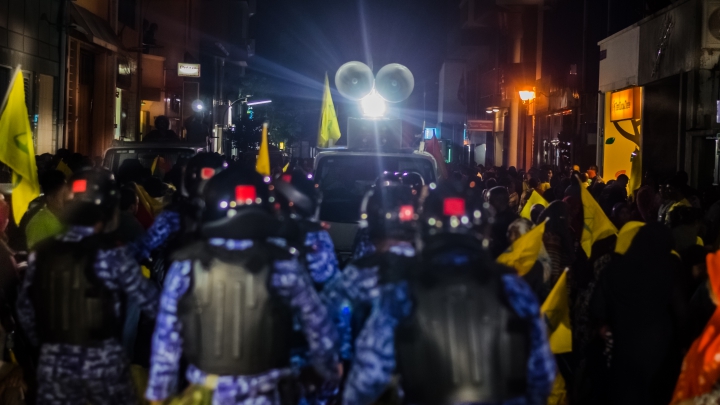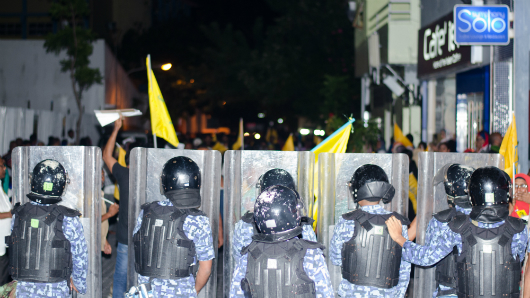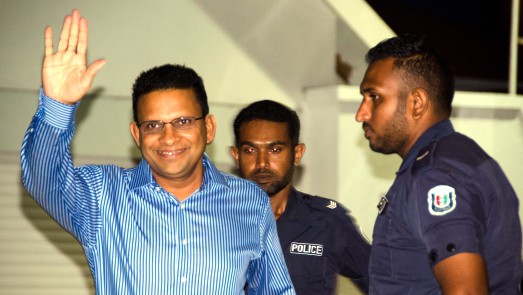Parliament has approved a three-month delay for the implementation of the new penal code amid vociferous protests by opposition MPs on the People’s Majlis floor.
The new penal code was ratified a year ago and was due to come into force tomorrow, but the ruling Progressive Party of Madives (PPM) claims more time is needed to raise awareness among the public.
However, both the attorney general and prosecutor general have said there is no reason to delay enforcement. The government has trained some 1,100 individuals including state prosecutors, police officers, customs staff, lawyers and journalists on the new law.
Critics say the existing penal code adopted in 1966 is outdated, draconian and not in line with international human rights conventions the Maldives is signatory to.
The main opposition Maldivian Democratic Party (MDP) contends that the postponement is a “politically motivated attempt to continue using the current penal code as a means to harass and intimidate the opposition.”
Hundreds of protesters face harsher punishment for ‘disobedience to order,’ a charge MDP argues the government uses to suppress rights to expression and assembly.
While similar offences are included in the new penal code, the punishment for protesters who do not have a criminal record would have been less severe as judges are required to take mitigating factors into consideration under sentencing procedures.
Show of hands
The government-sponsored amendment bill to the penal code was passed with 43 votes in favour and one against at an extraordinary sitting of parliament held today.
Prior to voting, MDP MPs took over the speaker’s chair and the secretariat desk and protested with megaphones and sirens, leaving Speaker Abdulla Maseeh Mohamed unable to use the electronic voting system and forcing secretariat staff to vacate their chairs.
In a scuffle between pro-government and opposition MPs, PPM MP Ahmed Assad grabbed and smashed one of the megaphones.
Pro-government MPs meanwhile surrounded Speaker Maseeh as he used a megaphone to ask for a show of hands. The secretary-general walked around the chamber and took the count.
Adhaalath Party MP Anara Naeem voted against the legislation.
MDP MPs have said the voting took place in violation of parliamentary rules as there was disorder in the chamber.
“During this time of increased political opposition to the [Abdulla] Yameen government, the MDP condemns the government’s use of their political majority to cripple the criminal justice system and restrict the rights of all Maldivians,” the party said in a statement.
However, majority leader Ahmed Nihan said former Speaker Abdulla Shahid had called a vote under similar circumstances in 2011, which can be considered a precedent under the standing orders.
Human rights NGO Maldivian Democracy Network has called on President Yameen not to ratify the amendments as the current law “is widely understood as draconian and unreflective of the democratisation process that was introduced to the Maldives through the constitution ratified in August 2008.”
Preparations
Speaking at a symposium about the new penal code yesterday, Attorney General Mohamed Anil said the country should bid farewell to the existing law “without any fear” as it was unsuited to the present day.
Former Prosecutor General Hussain Shameem told Minivan News today that 98 percent of police investigators have been provided extensive training as part of preparations for implementing the penal code.
Shameem has been involved in the training as a senior legal consultant at the Legal Sector Resource Centre established by the attorney general’s office with assistance from the UNDP to train and sensitise stakeholders.
A phone application for the penal code was launched yesterday and 12 information papers were published on the penal code website, he added.
Shameem noted that the website features an ‘ask us’ interactive function, marking the first time questions can be posed to experts regarding a Maldivian law.
“So the government is ready. The public are ready as all this information has been provided through the media as well. The documents and phone application are available. We have never been more prepared for a law than this,” he said.
Majority leader Nihan meanwhile told reporters that the PPM parliamentary group did not consult the attorney general’s office before today’s vote.
Nihan said ruling party MPs did not believe the public was adequately prepared, adding that the state broadcaster should show educational television programmes.
Revisions based on issues raised by religious NGOs can also be incorporated during the next three months, he said.
NGO Salaf said today that the new penal code is contrary to the principles of Islamic Sharia.
Likes (3)Dislikes
(3)Dislikes (0)
(0) 





